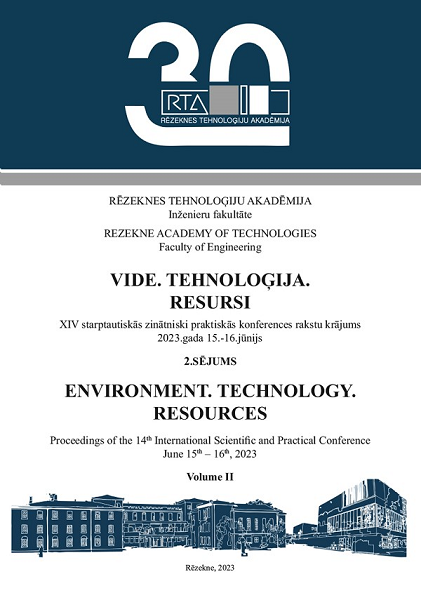BASIC KNOWLEDGE OF SOFTWARE AND WEB CONTENT AS ELEMENTS OF SOCIAL PROGRAMMING IN EDUCATION
DOI:
https://doi.org/10.17770/etr2023vol2.7258Keywords:
software, web content, social programming, teacher trainingAbstract
For any specialist, basic knowledge of his or her specialty is like a "daily routine" that should create comfortable conditions for the realization of basic professional tasks. At the same time, the changes brought about by the transition to a remote format of communication, professional activity and the need to use the mechanisms of the information society affect the basic process of socialization, formation and development of personality. This process is part of the educational process - the "knowledge acquisition routine" or social programming that meets the needs of the state, society, national culture, etc. And it cannot have primary and/or secondary aspects.
That is why the task of our research on this topic is to try to figure out what basic knowledge of software and web content, including programming skills, can be the necessary minimum in teacher training for everyday activities in the digital world (including the needs of society and the interests of children/youth). What should be a prerequisite for quality interaction between teachers, subjects and objects of the educational process in the digital world. In particular, what format, ethical norms and legislative aspects of regulation of the digital educational process, including relevant content, should be the basis for such interaction.
References
C. Joynes, S. Rossignoli, & E. Fenyiwa Amonoo-Kuofi. 21st Century Skills: Evidence of issues in definition, demand and delivery for development contexts (K4D Helpdesk Report). Brighton, UK: Institute of Development Studies. 2019.
C.L. Scott. The futures of learning 2: What kind of learning for the 21st century? In education research and foresight working papers. Unesco, 1, 24-37. 2015.
I. Mori, et al. 2nd survey of schools : ICT in education : objective 1 : benchmark progress in ICT in schools, final report. Publications Office of the European Union. Belgium. Retrieved from https://policycommons.net/artifacts/279326/2nd-survey-of-schools/1122622/ on 12 Apr 2023. 2019.
D. Gannon. Information and communication technology (ICT) in the primary school: Guidelines for Teachers. 2004.
S. Kaur. ICT Integrated Education: Shifting Role of Teachers. Scholarly Research Journal for Humanity Science & English Language. 6034-6042. 2016.
S. Munyengabe, D. Mukamusoni, J. Harindintwari, & J. C. Ndeze. Information Communication Technology as Catalyst for Pedagogical Changes to Generate a Smart Manpower Requirement in Developing Countries. EURASIA Journal of Mathematics, Science and Technology Education, 15(10). 2019.
L. Rosencrance. Definition software. March 2021. Application management tools and practices https://www.techtarget.com/searchapparchitecture/definition/software. Retrieved 16 Apryl 2023.
H.H. Pivniak, B.S. Busyhin, M.M. Diviziniuk ta in. Tlumachnyi slovnyk z informatyky. D. Nats. hirnych. un-t. 600. 2010.
O.M. Melnyk. Proektuvannia elektronnykh osvitnikh ihrovykh resursiv z matematyky dlia uchniv pochatkovoi shkoly: metodychni rekomendatsii. Kyiv : KOMPRYNT. 72. 2016.
A.V. Heta, V.M. Zaika, V.V. Kovalenko, E.A. Kosova, M.P. Leshchenko, P.A. Leshchenko & A.V. Yatsyshyn. Suchasni zasoby IKT pidtrymky inkliuzyvnoho navchannia. Poltava : PUET. 261. 2018.
V. Terziev. Social programming in the system of sociological categories concerning market economy and labor market development in transition economy. Kultura. Dukhovnost. Obshchestvo, (17), 100-123. 2015.
VMware, Inc. DRIVE LIMITLESS LEARNING Six Best Practices for Modernizing Higher Education IT https://www.vmware.com/content/dam/digitalmarketing/vmware/en/pdf/solutions/industry/vmw-ebook-highereducation-sixbestpractices.pdf. Retrieved 25 March 2023. 2018.
V. Terziev, V. Banabakova & M. Georgiev. Social programming as a possibility to increase social efficiency. Available at SSRN 3138151. 2018.
M.A. Polovyi & A.V. Fedukova. Sotsialne prohramuvannia: zmist poniattia. Aktualni problemy polityky. Zbirnyk naukovykh prats. Odesa: «Feniks». Vyp. 36. 61-67. 2009.



